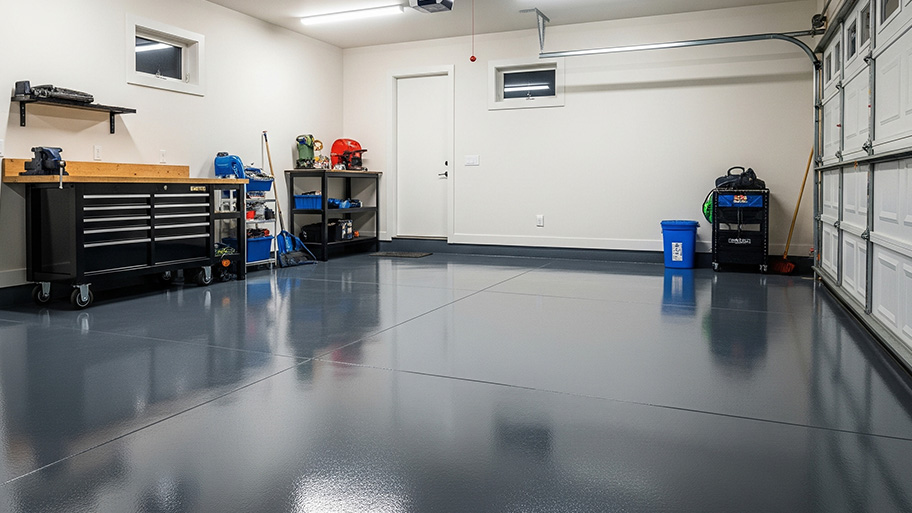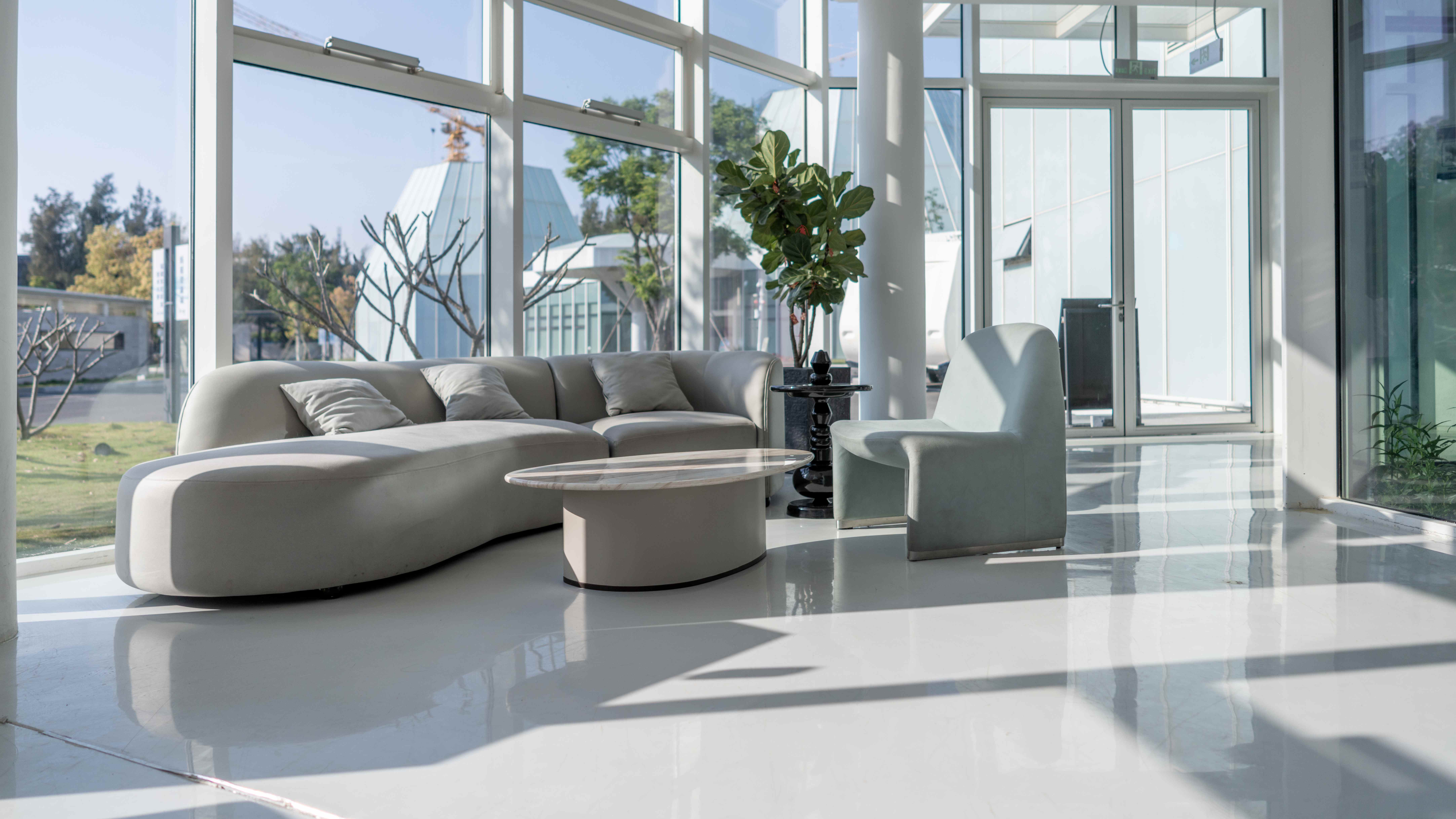
Garage floor replacement costs $2,200 on average but can vary depending on several factors. Review our guide for a more accurate estimate.
Epoxy floor care is easy—if you stay on top of it.


Choosing flooring for your home is a big decision, but if you are planning for a basement or garage, you cannot go wrong with epoxy. Epoxy floors are versatile and durable, thanks to their protective coating. Another bonus: The floor’s smooth surface makes cleaning and maintaining them simple, especially if you follow some go-to maintenance tips to make the cleaning routine even smoother.
Just like other areas of the home, regularly cleaning your epoxy floor is one of the best ways to keep it in good condition. If dirt or grit build up, they can easily get embedded in the floor, which can scratch the epoxy covering and damage the surface.
Use a vacuum or broom to sweep up any debris or dirt. If you clean regularly—daily to once a week—caring for and maintaining your epoxy floor will not take much time.

In addition to regular cleaning, you should do a deep clean twice a month. Sweep or vacuum the dirt and debris first, just as you would with a regular cleaning, then use a microfiber mop to clean the floor with ammonia diluted with hot water. (Typically, you will want to combine two to three ounces of ammonia per gallon of water.)
Cleaning your epoxy floor is simple, as long as you read the labels on cleaning products. Solutions that contain acids, including citrus or vinegar, may strip the epoxy of its glossy coating. You will also want to avoid using soap-based cleaners; the residue can leave a film coating, haze, or streaks that reduce the epoxy’s shine. The residue left by soap-based or acid-based cleaners can also make the floor slippery, which is a danger for everyone—but especially quick-moving kids or people with mobility issues.
Make the best epoxy floor cleaner yourself by mixing two to three ounces of ammonia with one gallon of water. Whether you have a single-color epoxy floor, a patterned floor, or a custom flooring installation created with other epoxy floor ideas, this cleanser will keep it looking its best.
Most epoxy floors are waterproof or water resistant, but you should still clean up spills right away. Water will not hurt epoxy, but it can make the floor very slippery and pose a danger to people walking through. Chemical spills and dark liquids, on the other hand, can stain and cause permanent damage.
If your epoxy floor is in your garage or a work area, watch for spilled gas, paint, solvents, and other chemicals. Some can stain the surface, while others can actually eat away at the epoxy surface. Clean these up with a shop cloth, then use plain water or a gentle cleaning agent to remove any remaining residue. Thoroughly dry the area once clean.
One of the best ways to remove a stain or spot on your epoxy floor is by using a soft scrubbing brush, pad, or even a kitchen sponge to scrub gently with warm water. Always avoid steel wool, harsh scrubbing, and abrasive cleaners, such as Comet, as these can damage the floor’s surface. Even rust stains can usually be gently scrubbed away with a kitchen pad or sponge.
If a stain stubbornly resists removal or you need help maintaining your epoxy floor, call a garage floor coating expert near you for help.
Epoxy floors are a great solution for garage flooring, but they are not indestructible against chemical compounds and car-related chemicals. Automotive oil, gasoline, car fluids, and other substances are often caustic, especially when left to sit on epoxy flooring. If you notice spills, use a soft cloth like a shop cloth to clean up as much of the mess as you can; use a gentle soap or detergent to remove any remaining chemicals; and rinse the area clean with plain water before drying it completely.
Tires will leave marks on epoxy flooring; fortunately, they are usually easy to remove. Using a concrete degreaser is the simplest way. Spray the degreaser onto the tire marks, being sure to soak the marks completely. Let the degreaser sit for about 10 minutes, longer if the marks are especially dark or heavy.
Scrub the marks with a stiff-bristled nylon brush. The marks should come up. If any remain, repeat the process, soaking and scrubbing until the floor is clean. Then rinse the floor with water and dry it thoroughly.
Stubborn stains might happen after spilled liquids sit too long on the floor, or they can occur when items are left to rust on the floor. Whatever caused the stain, act as soon as you notice it for the best chance at complete removal. Start with the mildest cleaning solution, such as diluted soap or diluted ammonia, and work your way up to stronger products, such as one part warm water mixed with one part CLR. Use a sponge, plastic scour pad, soft deck brush, or stiff-bristled nylon brush.
Never use steel wool or any abrasive cleanser or cleaning pad on an epoxy floor. You will scratch the surface, which makes future stains more likely and permanent.
Epoxy flooring costs are an investment, so you will want to care for your floor properly, including protecting it from damage. Most damage to epoxy happens when it gets scratched or gouged by heavy equipment, furniture legs, or walking on dirty floors. Place welcome mats at all entrances to help keep dirt and grime from getting tracked into the room. If you have epoxy flooring in the garage, you might want to place mats throughout for an extra protective cushion, especially if there is heavy equipment or furniture that could cause damage or scratches.
As with most flooring, epoxy’s sealed surface helps prevent liquids and dirt from penetrating and damaging the floor. Because epoxy floors are made of hard resin, however, they are susceptible to scratching. When the sealant and surface are scratched or gouged, it compromises the whole floor. For this reason, you should repair any scratches, dings, gouges, or other damage immediately.
For minor surface scratches, use a dry cloth to apply polish that matches your epoxy floor color. Rub the polish into the surface in circular motions until the scratches disappear. Then buff the floor with a clean cloth to bring out the shine so that it matches the rest of the flooring.
For deeper scratches, wet the floor and then rub a piece of fine-grain sandpaper across the scratch and the area around it. Rub until you have buffed the scratch out and the floor appears even. Rinse the whole area, then let it dry. Use a soft cloth to apply polish to the whole area, rubbing in circular motions until the scratched and buffed area looks like the floor around it.
From average costs to expert advice, get all the answers you need to get your job done.

Garage floor replacement costs $2,200 on average but can vary depending on several factors. Review our guide for a more accurate estimate.

Sealing concrete floors, patios, walkways, and driveways can keep them looking fresh for far longer. Let's break down the cost to seal concrete with a pro or on your own.

This guide breaks down the cost of installing epoxy flooring in your garage, basement, or other space. Costs depend on resin type, floor size, and more.

Will your space thrive with epoxy floors? Make sure the room's purpose and your budget align with the pros and cons of epoxy flooring.

Want to give your worn-out garage floor a makeover? Learn how to apply an epoxy floor coating with this simple guide.

Sealing your concrete helps it last longer—and look better. Learn how to seal concrete yourself to save money and keep it looking and performing like new.